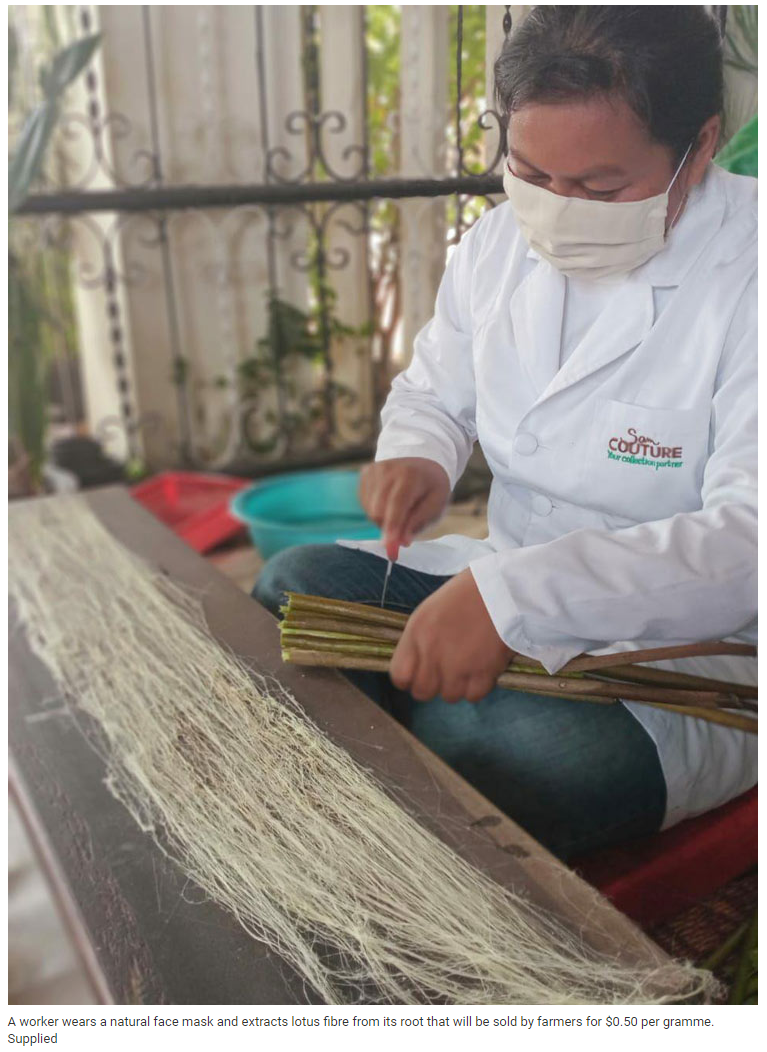Cambodia: More lotus fibres are needed for locally made natural face masks
Local eco-textile manufacturer Samatoa has called on farmers to help supply lotus fibres the business desperately needs to produce its highly popular “natural fibre face masks”.
Awen Delaval, CEO and founder of Samatoa, told Khmer Times that the company is now seeking more than 150 farmers who have half-hectare lotus fields, because the company needs a minimum of 50 hectares of land to produce 20,000 masks a week to supply the international market. Demand for a natural face mask is high but it is hard to source the amount of lotus fibre required.
Ordinary surgical masks are typically made from polypropylene and bonded together by chemicals, mechanical, heat or solvent treatment.
“We have created a new type of face mask using the lotus fibre and we have our staff to communicate with clients in France, the USA and Australia because we now already have thousands of orders for the face masks. Right now we are coordinating with farmers to help extract the fibre that we
can send to the Artisans Association of Cambodia (AAC) who will sew the mask together for us, said the French-born business owner.
“For every gramme of lotus fibre a farmer can provide to us we will pay them 2,000 riels (50 cents), we believe most farmers could extract between 40 to 80 grammes every day – potentially earning 80,000
to 160,000 riels ($20 to $40),” he added. The company explained that farmers will also not need to grow the plant from seed (because the process will otherwise take too long). Instead, farmers will be provided with a small plant from the company to be planted every two metres and will only take four weeks before being harvested.
“We will send our technical staff to visit and train the farmers on how to grow and then pick lotus stems and fibres correctly. It is not a difficult job, but farmers will need to learn and we will work with the poor communities until they are confident,” Delaval said. He added, that his company decided to use the lotus flowers for their face masks because their ecological footprint is almost nonexistent. No chemicals, electricity or petrol are used and the flowers are cleaned with the water they grow in. Also, no part of the flower goes to waste because they are dried in a solar oven. The petals are mixed with tea and the pistil is used to make soap and infused with coffee.
In addition to the lotus fibre face mask project, Samatoa also produces other handmade fabrics from natural products using both banana and kapok tree
fibres from Siem Reap and Battambang’s Kamping Poy Lake, with the aim to create decent jobs for vulnerable women in rural communities.
“My dream when I came [to Cambodia] was to help women emancipate and improve themselves with a job and work that they enjoy. In my opinion, Buddhism teaches people how to grow from the mud to improve themselves.
“This symbolism is very strong and has taught me a lot,” Delaval added.
Source: https://www.khmertimeskh.com/50720249/more-lotus-fibres-are-needed-for-locally-made-natural-face-masks/


 Thailand
Thailand




